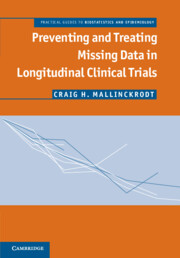Book contents
1 - Why Missing Data Matter
Published online by Cambridge University Press: 05 February 2013
Summary
The evidence to support new medicines, devices, or other medical interventions is based primarily on randomized clinical trials. Many of these trials involve assessments taken at the start of treatment (baseline), followed by assessments taken repeatedly during and in some scenarios after the treatment period. In some cases, such as cancer trials, the primary post-baseline assessments are whether or not some important event occurred during the assessment intervals. These outcomes can be summarized by expressing the multiple post-baseline outcomes as a time to an event, or as a percentage of patients experiencing the event at or before some landmark time point. Alternatively, the multiple post-baseline assessments can all be used in a longitudinal, repeated measures analysis, which can either focus on a landmark time point or consider outcomes across time points.
Regardless of the specific scenario, randomization facilitates fair comparisons between treatment and control groups by balancing known and unknown factors across the groups. The intent of randomization in particular, and the design of clinical trials in general, is that differences observed between the treatment and control groups are attributable to causal differences in the treatments and not to other factors.
Missing data is an ever-present problem in clinical trials and has been the subject of considerable debate and research. In fact, the U.S. Food and Drug Administration convened an expert panel to make recommendations for the prevention and treatment of missing data (NRC, 2010). The fundamental problem caused by missing data is that the balance provided by randomization is lost if, as is usually the case, the patients who discontinue the study differ in regards to the outcome of interest from those who complete the study.
- Type
- Chapter
- Information
- Preventing and Treating Missing Data in Longitudinal Clinical TrialsA Practical Guide, pp. 3 - 8Publisher: Cambridge University PressPrint publication year: 2013



